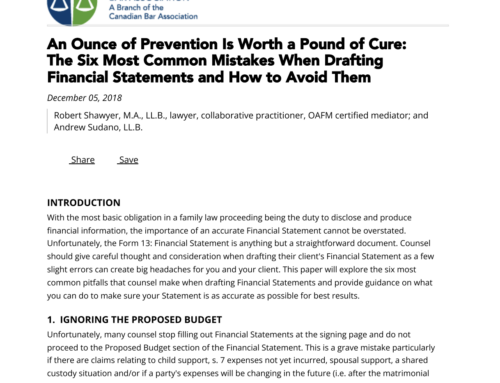Shortly after being called to the Bar, I had the opportunity and privilege to represent a client that argued that section 31 of the Family Law Act discriminates against adult disabled children of unmarried parents on the basis of parental marital status and disability, contrary to section 15 of the Canadian Charter of Rights and Freedoms: Vivian v Courtney, 2012 ONSC 6585. As I practice family law, it would be fair to say that Charter challenges seldom arise in my day-to-day practice. Thus, the unique experience allowed me to learn about myself and what motivates me as a lawyer and advocate.
As noted by Penny J. in paragraphs 26 and 27 of his reasons for the decision in Vivian v Courtney, there are fundamental differences between a child’s right of support under the Divorce Act and Ontario’s Family Law Act, namely:
“…Under the Divorce Act, a “child of the marriage”, that is, a person who continues to be entitled to child support pursuant to the Act, is defined to include a person who is “the age of majority or over and under their charge but unable, by reason of illness, disability or other cause, to withdraw from their charge or to obtain the necessaries of life,” Divorce Act, R.S.C. 1985, c. 3 (2nd Supp.) at s. 2(1). The Divorce Act is clearly not applicable to this case as the parties were never married.
In Ontario, the FLA does not contain an identical provision to the Divorce Act regarding the entitlement of a child over 18 years old to support. Unlike the Divorce Act, s. 31 of the FLA provides:
Every parent has an obligation to provide support for his or her unmarried child who is a minor or is enrolled in a full-time program of education, to the extent that the parent is capable of doing so.
There is no provision corresponding to the Divorce Act with respect to disabled adult children.” [emphasis added]
From our client’s perspective, to deny disabled children of unmarried parents the right to child support solely because their parents were not married is discriminatory. We argued that the denial of child support for a disabled child of unmarried parents not enrolled in a full program of education draws a distinction on the basis of personal characteristics that are immutable and unchangeable, namely disability and the legal status of a parent’s child. Further, we submitted that section 31 of the Family Law Act perpetuates the pre-existing disadvantage of children of unmarried parents and withholds the benefit of the law in at least the following respects:
- Withholds financial support and security to disabled children of unmarried parents
- Denies equal respect, concern, and consideration to disabled children born outside of marriage
- Withholds access to family law rights, obligations, and protections
- Causes confusion and unfairness
- Perpetuates stigma towards children born outside of marriage
- Denies a fundamental right to all children of separated parents
While Penny J. ruled at paragraph 80 that the resolution of the Charter issues was not necessary for the disposition of the appeal in that case, the constitutionality of section 31 of the Family Law Act, regrettably, remains unresolved.
In reflecting on my experience during this case, I am grateful for the opportunity and experience to advance a Charter challenge. I learned that the opportunity to impact not only one person’s life but the lives of people across the Province based on my work on one case is a significant, satisfying and humbling challenge. Most importantly, it reminded me of one of the reasons I went to law school, namely to advance social justice issues and shape the law to benefit those who are disenfranchised and the victims of discrimination. Having said that, I look forward to the opportunity of, perhaps one day, challenging the constitutionality of section 31 of the Family Law Act again and ensuring that disabled children of unmarried parents are entitled to the equal benefit of the law.
ABOUT THE AUTHOR
Andrew Sudano




